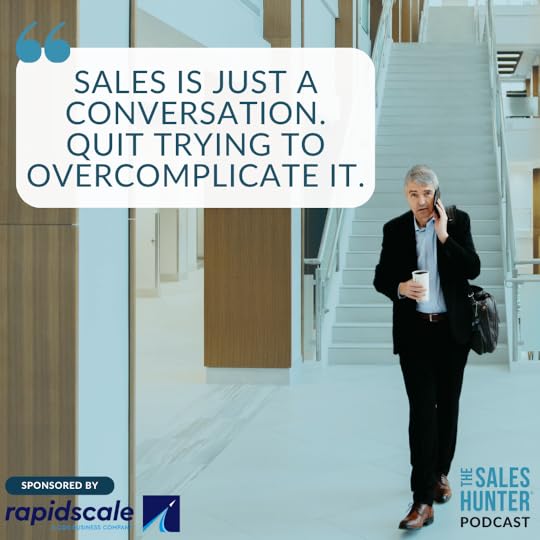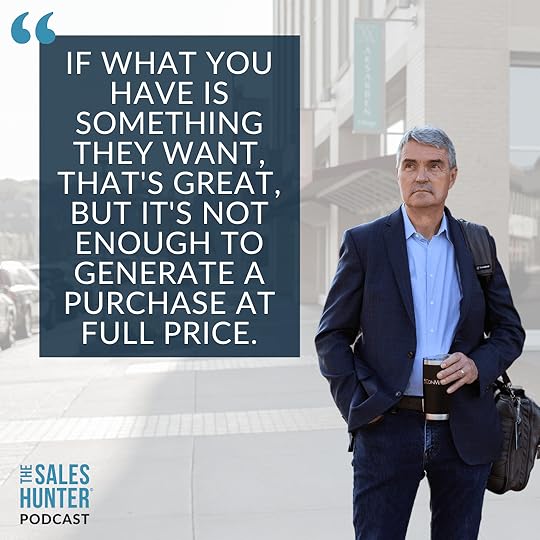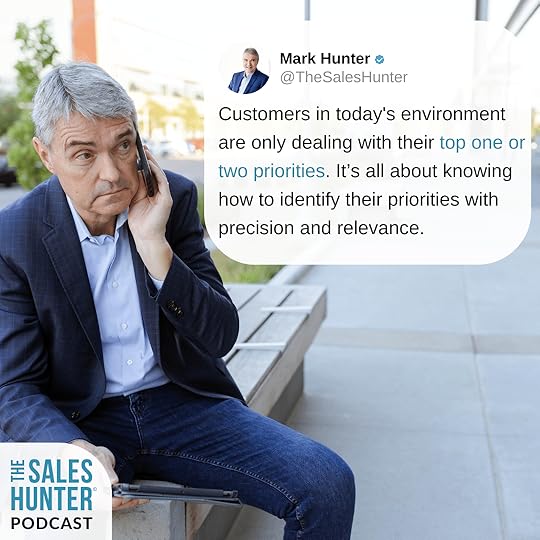Mark Hunter's Blog, page 6
November 25, 2024
Strengthen Your Value Prop with These 5 Questions
How to Create a Powerful Value Proposition for Sales Success
I’m breaking down some key elements from my annual planning process to help you fine-tune your value proposition.
Let’s make sure your value proposition is driving the results you want.
https://www.youtube.com/watch?v=YCNEsxl4d1Y
At its core, your value proposition is the statement that explains why your product or service will help your customers. It’s not a list of features—it’s about the benefits you provide. Your value proposition should immediately resonate with your prospects and prompt them to say, “Tell me more.”
A well-crafted value proposition can differentiate you from your competition and show customers how your solution addresses their exact needs.
5 Key Questions to Define Your Value PropositionTo create a compelling value proposition, you need to ask yourself a few key questions:
What is my value proposition?
A strong value proposition is clear, concise, and customer-focused.
→: What benefits do my customers receive by working with me? How do I solve their problems or help them achieve their goals?
What questions should I ask to explore my value proposition?
Once you’ve stated your value proposition, it’s essential to follow up with the right questions to ensure it’s truly aligned with your prospects’ needs.
→ Are they a qualified prospect? Do they fully understand the value of what you’re offering?
How does my value proposition stand up in the market?
Analyze your value proposition in the context of your competition. Does it offer something unique? Think of companies like Starbucks—they didn’t succeed by mimicking other coffee chains; they differentiated their brand.
→ Does my value proposition give me a competitive edge?
Do I need to tweak my value proposition?
Your value proposition should evolve over time as market conditions, customer needs, and societal trends change. While you don’t need to overhaul it every year, minor adjustments—such as a 30-40 degree shift—might be necessary to keep it relevant and powerful.
→Do I need to make some changes because it doesn’t stand up in the marketplace anymore?
Do I need different variations of my value proposition?
Depending on your ideal customer profile (ICP) or specific products/services, you might need tailored versions of your value proposition. For example, my general value proposition is about helping companies sell at full price without discounting, but for different clients, I might emphasize different aspects of my approach.
The Dual Purpose of a Value Proposition
Remember, your value proposition serves two important purposes:
Generate Interest: It should make your customers want to know more.Qualify Leads: It helps you assess whether a prospect is worth pursuing.If your value proposition sparks curiosity and resonates with the right audience, you’ll find it easier to convert leads into loyal customers.
 Get My Annual Planning Workbook
Get My Annual Planning WorkbookWhat I’ve shared with you today is just a preview of the strategies from my Annual Planning Workbook. It’s a comprehensive guide designed to help you refine your sales approach and set clear goals for the year ahead.
To get it, join me live for my Annual Planning Program…
December 06, 1 PM-3:30 PM CST
OR
December 17, 10 AM-12:30 PM CST
When you sign up you’ll get a 29-page workbook, a seat at either of my two live programs, and a full replay.
This entire program is yours for only $395. A small investment for the benefits you’ll gain to achieve success next year.
Questions? Email me directly at ma**@th************.com with the subject line “Annual Plan.”
 AI Can’t Do These 3 Things…
AI Can’t Do These 3 Things…But YOU Can!
Position yourself ahead of the AI curve.
Equip yourself with the skills to thrive.
Find episode #259 wherever you download podcasts!
How Trust Shapes Sales Outcomes w/ Yoram SolomonDiscover why trustworthiness is valued by 77.6% of people as the most important trait in sales professionals.
Episode #260 is out now!

Copyright 2024, Mark Hunter “The Sales Hunter” Sales Motivation Blog. Mark Hunter is the author of A Mind for Sales and High-Profit Prospecting: Powerful Strategies to Find the Best Leads and Drive Breakthrough Sales Results.
November 19, 2024
12 Key Strategies to Become a Top-Performing Salesperson
Success in sales isn’t a one-time event; it’s an ongoing process.
Are you ready to become a top-performing salesperson? Whether you’re just starting out or looking to refine your skills, there are specific actions you can take to elevate your sales game.
In this post, I’ll share 12 essential strategies for success in sales that can help you achieve peak performance and reach your goals.
https://youtu.be/OdipsoNz8X01. Develop Deep Product Knowledge
You need to know your product inside and out.
This doesn’t mean you have to know everything, but having a deep understanding of your product will help you explain how it benefits your customers. While you don’t want to be overly focused on features, a strong grasp of product knowledge will enable you to shift the conversation toward benefits that resonate with your clients.
2. Refine Your Prospecting SkillsProspecting is a critical skill that never stops evolving. Whether you’re finding new leads through cold outreach or refining your ideal customer profile (ICP), continuously improving your prospecting techniques is essential.
It may be a different question I need to ask. It may be a slightly different twist on my ICP, but I’m zeroed in on always improving.
3. Master the Art of Listening and Understanding NeedsLet your customer take control of the conversation, and focus on truly understanding their needs.
By asking the right questions and listening carefully, you’ll gain valuable insights that allow you to tailor your pitch to solve their specific challenges.
4. Refine Your Sales Process and StrategyBy refining your sales strategy—whether it’s improving your talking points, using tailored materials, or optimizing your follow-up methods—you’ll increase your chances of closing deals faster.
Refining your sales process also means that you treat your prospect just like your customer. If there’s information I send to customers, I send it to my prospects as well.
5. Master the Art of Handling Objections
Objections are a natural part of the sales process, and top performers welcome them. Objections are signs that the customer is engaged, and they provide an opportunity for you to further address concerns.
Every time I hear an objection, I write it down. I write it down in my CRM system for that particular customer, and I also write it down in kind of a note section. Use objections as learning experiences to improve your responses for future sales interactions.
 6. Strengthen Your Closing Techniques
6. Strengthen Your Closing TechniquesThe best salespeople are confident and calm when it comes time to close a deal. Closing should feel natural and not rushed, because top performers have already done the work in the earlier stages of the sales process.
7. Build and Nurture Relationships
The key word is nurture. Sales is about more than just making the deal—it’s about creating long-term relationships.
Continuously engage with prospects and clients through follow-up emails, calls, or social media, and build a network of industry experts and thought leaders who can help you grow.
8. Invest in Your Personal and Professional DevelopmentNever stop learning. The best salespeople are constantly investing in their personal and professional growth.
I don’t expect my company to do everything for me. I’m willing to invest my time.
9. Cultivate a Positive and Resilient Mindset
There are peaks and valleys in every sales business right now. Even during a slow sales month, focus on your progress and successes, and remain motivated to keep moving forward. A strong mindset helps you bounce back quickly and maintain momentum.
10. Use Data to Your AdvantageData is your best friend. Use it to track key metrics like lead conversion rates, sales cycle length, and win/loss ratios.
What data does your CRM system tell you in terms of your closing ratio? Your prospecting ratio?How many calls it takes to close a deal?
11. Manage Your Time EfficientlyTime is your most valuable asset, and successful salespeople protect it. Prioritize your daily tasks, eliminate distractions, and always focus on activities that move the needle forward.
12. Celebrate Wins and Learn from Losses
At the end of the week, I always take a step back and look at my week—what went right, what didn’t go right? Celebrating your wins helps keep you motivated, while learning from your losses ensures continuous improvement.
Use those insights to adjust your strategy moving forward. The key is to learn from every experience and use that knowledge to grow.

Don’t Make This Mistake Next Month!
Discover how a simple calendar quirk could derail your first-quarter goals.
Find Ep. #257 on all podcast platforms.

A Blueprint for Trust
w/ Meredith Bell
This episode is filled with practical insights on how genuine curiosity and interest in others can redefine the dynamics of sales conversations.
Find it anywhere you listen to podcasts! E258
Copyright 2024, Mark Hunter “The Sales Hunter” Sales Motivation Blog. Mark Hunter is the author of A Mind for Sales and High-Profit Prospecting: Powerful Strategies to Find the Best Leads and Drive Breakthrough Sales Results.
November 13, 2024
How to Recover When You Miss Your Sales Plan
Whether it’s an annual, quarterly, or monthly goal, missing a plan is a reality every salesperson faces at some point. In this post, I’m going to share 9 key actions you can take to recover from missed sales targets and set yourself up for success in the future.
1. Conduct a Year-End Sales ReviewThe first step after missing your sales target is to conduct a year-end sales review. Whether you missed a quarterly or annual goal, it’s essential to evaluate where things went wrong. Ask yourself:
What customers did I successfully close?Which deals slipped through the cracks?Did I make enough sales calls?Were there specific periods of the year when my performance improved? Why?Use this review to identify areas where you can improve and leverage existing customers that offer the greatest upsell potential.
2. Break Down Your Annual Sales Goals into Manageable PiecesLarge goals can feel overwhelming, but when broken down into smaller, manageable pieces, they become more attainable. For example:
How many sales calls do you need to make?How many conversations or emails should you send?Tip: Focus on one key metric. For me, it’s having five conversations a day—this is my metric for success. If I consistently hit that target, my business will thrive.
3. Enhance Your Lead Qualification ProcessTake time to refine your lead qualification process by focusing on your Ideal Customer Profile (ICP). By targeting the right leads, you can spend more time with fewer prospects.
Follow up faster on both inbound and outbound leads to prevent them from slipping through the cracks.
4. Evaluate Pipeline Management and Clean Up Your PipelineRead What Is Your Customer’s Preferred Method of Communication
A cluttered sales pipeline can prevent you from hitting your targets. Take a critical look at your pipeline and ask yourself:
Are you holding onto deals just to appease your manager?Are you keeping “big logo” accounts just to look good, even though they’re unlikely to convert?Pipeline management is about having the right mix of opportunities. Don’t waste time with deals that won’t bring results.

via Northern Ireland on GIPHY
 5. Improve Your Sales Follow-Up Strategy
5. Improve Your Sales Follow-Up StrategyImproving your follow-up skills is one of the most impactful ways to increase your close ratio. Salespeople who have a difficult time closing deals generally have a hard time following up and following through.

via Saturday Night Live on GIPHY
Ask yourself: Is your CRM open right now? If it’s not, you’re missing out on a valuable tool that helps you stay organized and focused on closing deals.
This is a really simple measurement that I have for finding out whether or not someone is really dialed in and wanting to improve their sales success. Is their CRM open?
There’s no such thing as a perfect CRM. However, it provides a repository for you to keep information, keep you on track and allow you to understand what you need to do.
7. Set Clear Sales Milestones and AccountabilityTo get back on track, you need to set clear sales milestones. These are the smaller, daily or weekly tasks that help you progress toward your bigger goals. For example:
“I’ll make 5 calls today.”“By the end of the week, I will follow up with 10 leads.”Milestones make your goals feel less overwhelming and give you clear benchmarks to measure progress.
It’s also important to share your milestones with others to hold yourself accountable. Sales is not a solo activity. Sales is a team sport!
8. Identify Potential Setbacks and Plan for ObstaclesWhen things don’t go according to plan, it’s crucial to identify potential setbacks. Look at the past year and ask yourself:
Where did things go wrong?What could potentially derail my progress going forward?If there’s a large deal in your pipeline that requires significant outside resources (from either your company or the customer), think about the potential setbacks.
How will you navigate around them?9. Maintain a Positive and Resilient MindsetFinally, one of the most important steps in recovering from a missed sales target is to maintain a positive mindset. It’s easy to get discouraged, but a resilient attitude will help you bounce back stronger.
I have an annual planning process that I want to share with you. Send me an email to ma**@th************.com and I’ll show you how this annual plan can work for you.
 How Balanced Is Your Sales Pipeline?
How Balanced Is Your Sales Pipeline?Mark dissects elements we often overlook:
opportunity sizeclosure timingand complexity.Find episode #255 wherever you download podcasts!
Winning Customers with Emotionally Charged Experiences w/ Sonia DumasJoin Mark and Sonia as they share strategies to develop a sales approach that captivates and deeply engages your audience.
Episode #256 is out now!

Copyright 2024, Mark Hunter “The Sales Hunter” Sales Motivation Blog. Mark Hunter is the author of A Mind for Sales and High-Profit Prospecting: Powerful Strategies to Find the Best Leads and Drive Breakthrough Sales Results.
November 6, 2024
9 Critical Sales Mistakes to Avoid
Today, I want to share nine critical sales mistakes I’ve made throughout my career—and the lessons you can learn from them.
1. Not Taking NotesOne of my biggest blunders has been failing to take notes during customer interactions. Whether it was relying on my memory, or jotting things down on a scratch pad, I often neglected to log important details in my CRM. This led to me asking the same questions multiple times, which not only confused my clients, but also hindered my sales.
Always document your conversations to maintain clarity and build rapport.
2. Selling After the Customer Says YesDuring my early days in sales in Knoxville, Tennessee, I encountered a challenging customer. After he agreed to purchase, I literally talked him out of buying from me. Why? Because I was talking about all kinds of stuff. And it got him thinking, well, maybe he rushed too quickly to make a decision, and he chose not to buy.

via The Sales Hunter on GIPHY
When the customer says yes, stop selling! Get the order and move on.
3. Mixing Up Decision MakersAbout 20 years ago in Omaha, I mixed up decision-makers. I thought I was addressing the right person when, in fact, it was someone else. I was able to save the deal, but boy, it was embarrassing.
Always identify and keep track of decision-makers to avoid similar pitfalls.
4. Doubting Your Own PricingWhen I started in sales in Portland, Oregon, I struggled with doubting our pricing. I didn’t believe in the value of our products, which was reflected in my poor sales performance. I remember when my boss called me out on it.
It’s not the price, it’s the outcome you create. Confidence in your pricing can significantly impact your success.
5. Procrastinating on Follow-Ups
Mid-career, I often delayed follow-ups, thinking I could handle them later. Things got pushed to days later—sometimes weeks later. This habit led to missed opportunities and lost sales.
For instance, a client told me to “keep in touch,” and I interpreted that as a casual follow-up in a few weeks rather than immediate action days later.
Don’t put off follow-ups; they are crucial for maintaining relationships and closing deals.
 6. Failing to Ask for the Order
6. Failing to Ask for the OrderIn another instance in Portland, I got sidetracked during a meeting and forgot to ask for the order. I never got around to asking for the order, and I left. And a whole month went by before I was able to come back physically.

via The Sales Hunter on GIPHY
See, I didn’t ask for the order when I should have. Always ask for the sale when the moment feels right—hesitation can lead to lost opportunities.
7. Allowing Customers to Push You AroundI learned the hard way that it’s essential to maintain boundaries with clients. A customer in New Jersey would always ask me for one more thing, one more thing. And I would give in!
I talked with my boss about it and he said, “You’re falling for it. You’re allowing the customer to push you around. Here’s what we deliver, how we deliver it, the terms we delivered. And that’s it. Don’t allow them to create exceptions because you are creating havoc on our shipping, distribution, and customer service because of the exceptions you’re trying to make.”
8. Failing to Stay in TouchOne of my key takeaways is that closing a sale opens the door to building a long-term relationship. I often moved on to the next prospect without nurturing existing clients.
As my friend Meredith Elliot Powell says, “The sale is made in the follow-up.” Regularly check in with your clients to maximize your business potential.
9. Thinking You Can Wing It
Finally, I learned that preparation is key. In Houston, I thought I could deliver a presentation without proper prep and ended up missing a significant opportunity. I thought I knew my stuff, and I fell all over myself. I missed the opportunity on a big giant order with a major account because I thought I could wing it.
Always be ready; thorough preparation can make all the difference.
Turning Conversations into Lasting Relationships
Imagine stripping away all complexities and focusing on genuine, straightforward interactions.

 Elevate Your Professional Brandw/ Corey Perlman
Elevate Your Professional Brandw/ Corey Perlman
Learn effective social media strategies tailored for professionals seeking to enhance their business and personal branding.
Ep. 254 is out NOW! Find it wherever you podcast.
Copyright 2024, Mark Hunter “The Sales Hunter” Sales Motivation Blog. Mark Hunter is the author of A Mind for Sales and High-Profit Prospecting: Powerful Strategies to Find the Best Leads and Drive Breakthrough Sales Results.
The post 9 Critical Sales Mistakes to Avoid first appeared on The Sales Hunter.
October 30, 2024
10 Sales Myths Blocking Your Success
Today I’m uncovering 10 sales myths that might be hindering your success.
1. Now is not the right time to reach out.Many people believe they can’t reach out at certain times—like Mondays or Fridays. This is a myth! The best time to make a call is right now.
Now is the right time. You’re going to wind up shrinking your sales window down to a ten minute window every Wednesday, and that’s it. Wrong. You’re going to miss out on a tremendous amount of opportunity. Don’t miss out—make the call!
2. I’m bugging them with my messages.If you think you’re bothering potential customers with multiple messages, think again. You’re not bugging them if you’re giving them value.
I’ve closed deals after 20, 30, or even 40 touchpoints because I focused on delivering new value each time.
3. They said they would get back to me.How often have you heard this? Just because a prospect says they’ll follow up doesn’t mean they will. Don’t rely on them to reach out, take the initiative to contact them again. If you can help them, you owe it to them to reach out.
4. The phone doesn’t work anymore.Contrary to popular belief, the phone is more effective now than it has been in years. With the rise of automation and AI, people crave genuine relationships. One meaningful conversation can yield more insights than a dozen emails.
The phone is the way you allow your personality to come through

via GIPHY5. If our prices were lower, I’d close more sales.
While price matters, trust is crucial. In the absence of trust, low prices become everything. Focus on creating value and helping customers achieve their goals, and they will be willing to pay more.
6. I need a bigger pipeline.
Read 5 Tips to Never Discount Your Price Again.
It’s not about having a large pipeline; it’s about the quality of the prospects in it. Focus on nurturing a few high-quality leads rather than spreading yourself too thin. I’ve closed significant deals with a small but focused pipeline.
7. I can’t close, and that’s my biggest problem.If you’re struggling to close deals, the issue likely lies upstream—in your prospecting efforts. The reason people struggle closing is because they haven’t understood the need.
Understand your customers’ needs through thorough discovery calls, and the closing process will become much smoother.
8. I don’t have time to prospect.Saying you don’t have time to prospect is often a matter of priority.
Did you not eat at all yesterday? I have a feeling you found time to eat. Just as you find time to eat, you can find time to prospect. Schedule it as a key activity.
That’s why I say start your prospecting before 10:00 AM. Get it going early. Make it happen.

via NFL on GIPHY9. Everyone else has better luck than me.
Luck is not the main factor in success; it’s about putting yourself in the right situations. By actively reaching out and engaging with potential clients, you create your own opportunities for “luck.”
I don’t count it as luck. It’s because you did the work to make yourself visible. You did the work to put yourself in front of customers, create the relationships, to make things happen.
10. If only my company provided better training.Don’t wait for your company to train you. Take charge of your own development.
Utilize resources like my videos, the Sales Hunter University, and my podcasts to enhance your skills. You are responsible for your own learning.
Become an IndispensableCheck out Mark’s masterclasses at The Sales Hunter University.
Sales Leader
Learn how top sales performers go beyond mere product knowledge and tactics to create deep emotional connections with customers.
Episode #251 is out NOW! Find it everywhere.
Finding Confidence in True Connectionsw/Rita Goodroe
By showing up as our authentic selves, we invite others to engage with us more genuinely.
Copyright 2024, Mark Hunter “The Sales Hunter” Sales Motivation Blog. Mark Hunter is the author of A Mind for Sales and High-Profit Prospecting: Powerful Strategies to Find the Best Leads and Drive Breakthrough Sales Results.
October 28, 2024
10 Sales Myths Blocking Your Success
Today I’m uncovering 10 sales myths that might be hindering your success.
1. Now is not the right time to reach out.Many people believe they can’t reach out at certain times—like Mondays or Fridays. This is a myth! The best time to make a call is right now.
Now is the right time. You’re going to wind up shrinking your sales window down to a ten minute window every Wednesday, and that’s it. Wrong. You’re going to miss out on a tremendous amount of opportunity. Don’t miss out—make the call!
2. I’m bugging them with my messages.If you think you’re bothering potential customers with multiple messages, think again. You’re not bugging them if you’re giving them value.
I’ve closed deals after 20, 30, or even 40 touchpoints because I focused on delivering new value each time.
3. They said they would get back to me.How often have you heard this? Just because a prospect says they’ll follow up doesn’t mean they will. Don’t rely on them to reach out, take the initiative to contact them again. If you can help them, you owe it to them to reach out.
4. The phone doesn’t work anymore.Contrary to popular belief, the phone is more effective now than it has been in years. With the rise of automation and AI, people crave genuine relationships. One meaningful conversation can yield more insights than a dozen emails.
The phone is the way you allow your personality to come through

via GIPHY5. If our prices were lower, I’d close more sales.
While price matters, trust is crucial. In the absence of trust, low prices become everything. Focus on creating value and helping customers achieve their goals, and they will be willing to pay more.
Read 5 Tips to Never Discount Your Price Again.
 6. I need a bigger pipeline.
6. I need a bigger pipeline.It’s not about having a large pipeline; it’s about the quality of the prospects in it. Focus on nurturing a few high-quality leads rather than spreading yourself too thin. I’ve closed significant deals with a small but focused pipeline.
7. I can’t close, and that’s my biggest problem.If you’re struggling to close deals, the issue likely lies upstream—in your prospecting efforts. The reason people struggle closing is because they haven’t understood the need.
Understand your customers’ needs through thorough discovery calls, and the closing process will become much smoother.
8. I don’t have time to prospect.Saying you don’t have time to prospect is often a matter of priority.
Did you not eat at all yesterday? I have a feeling you found time to eat. Just as you find time to eat, you can find time to prospect. Schedule it as a key activity.
That’s why I say start your prospecting before 10:00 AM. Get it going early. Make it happen.

via NFL on GIPHY9. Everyone else has better luck than me.
Luck is not the main factor in success; it’s about putting yourself in the right situations. By actively reaching out and engaging with potential clients, you create your own opportunities for “luck.”
I don’t count it as luck. It’s because you did the work to make yourself visible. You did the work to put yourself in front of customers, create the relationships, to make things happen.
10. If only my company provided better training.Don’t wait for your company to train you. Take charge of your own development.
Utilize resources like my videos, the Sales Hunter University, and my podcasts to enhance your skills. You are responsible for your own learning.
Check out Mark’s masterclasses at The Sales Hunter University.
The post 10 Sales Myths Blocking Your Success first appeared on The Sales Hunter.
October 23, 2024
10 Sales Team Problems and How to Fix Them
These 10 issues are correctable, and identifying one or two to focus on can lead to significant improvements.
As you read, see what resonates with your team and consider how to address them effectively.
1. Lack of a Unified Sales ProcessWhen everyone follows their own method, achieving collective greatness becomes impossible. Individuals might do well, but as a team, you won’t.
Implement a unified sales process to boost individual and team performance.

via HuMandalas on GIPHY2. Inaccurate Forecasting
Many sales leaders grapple with forecasting issues. If team members are sandbagging or overly optimistic about their numbers, it’s crucial to bring everyone together to create a standardized approach to forecasting.
You’re not always going to have time as a leader to massage all the numbers—and what happens if management above you wants to look at individual numbers? Accurate forecasts enable effective decision-making and resource allocation.
3. Poor Time ManagementHelp your team prioritize their tasks effectively, ensuring they allocate sufficient time for crucial activities like prospecting. Many times it’s prospecting that gets overlooked.
Model good time management practices to encourage your team to take control of their schedules. Don’t let the day control you!
4. Lack of Follow-Through
Follow-through begins with leadership. If you ask your team to complete tasks, follow up consistently. More productivity is lost because of a lack of follow through.
This discipline will encourage your team to follow up diligently with their customers.
5. Inadequate Lead GenerationSales leaders must take ownership of lead generation. Blaming marketing won’t solve the problem. Own it. Everybody has a key role in developing leads.

via Shalita Grant on GIPHY
 6. Low Closing Ratios
6. Low Closing RatiosThe vast majority of time, it’s not your closing that’s the problem, it’s your opening—it’s your prospecting. Often, the problem lies upstream—are they prospecting the right individuals and validating their needs? Focus on improving the opening phase of the sales process.
7. Blaming Price for Lost SalesThis is a disease that will eat away at your organization if you allow it to.
Salespeople often attribute lost sales to price rather than examining their sales process. Encourage your team to create more value for customers and address underlying issues in their approach.
8. Underutilization of CRMRead how Your Price Reflects Your Confidence
Lead by example by integrating CRM usage into your daily operations. Use it as a productivity tool rather than a compliance check.The CRM is an improvement tool, not a gotcha tool.
If you don’t make theCRM a part of your coaching and managing process, they’re not going to make it part of their business.

via Visum on GIPHY9. Lack of Commitment to the Sales Team
Your commitment to the success of your sales team is crucial. Make sure that your team is getting regular positive signals from the c-suite, fto help them feel that there is a real commitment in the company to the role that salespeople play.
10. Failing to Recognize the Value of SalesSalespeople often feel undervalued, which can lead to decreased motivation. Emphasize the critical role they play in the company’s success. Remind them that if sales is not doing their job well, nobody else in the company has a job. Nothing happens until something is sold.
 Redefining Value Without Discounts
Redefining Value Without DiscountsHow can you make price a secondary concern in a customer’s buying decision?
Find Ep. 249 wherever you enjoy podcasts!
Presentations that Leave an Impressionw/ Tom MartinTom shares his wisdom on focusing presentations around a central message, keeping things simple and clear.
Ep. 250 is out today! Find it wherever you podcast.

Copyright 2024, Mark Hunter “The Sales Hunter” Sales Motivation Blog. Mark Hunter is the author of A Mind for Sales and High-Profit Prospecting: Powerful Strategies to Find the Best Leads and Drive Breakthrough Sales Results.
The post 10 Sales Team Problems and How to Fix Them first appeared on The Sales Hunter.
October 16, 2024
15 Coaching Strategies to Boost Sales Performance
Having the right coach is crucial. Here are 15 essential coaching practices to enhance your effectiveness, whether you’re the coach or the one being coached.
1. Understand Individual NeedsSuccessful coaching starts with recognizing the unique needs of each individual. Tailor your approach to their professional and personal circumstances.
2. Demonstrate ConsistencyConsistency is key. Schedule regular coaching sessions—such as every Tuesday at 2 PM—and stick to it. This builds trust and establishes reliable expectations, helping your team feel secure in their coaching environment.
Success in sales is about being consistent in what you do, and it starts with how you coach.

via The Ed Sullivan Show on GIPHY3. Set Clear Goals
Set clear goals, not dreamy goals, not ambiguous goals. What is it specifically that you want them to achieve?
Define what success looks like, establish timelines, and determine how progress will be tracked. Clarity fosters accountability.
4. Use Real DataBase your coaching on concrete data. Instead of general observations, present specific metrics that illustrate your points. This not only enhances credibility, but also empowers your team to act on informed insights.
5. Provide Regular Feedback
Feedback should flow both ways. You’ve got to let them have a chance just to share with you. Remember, you’re coaching them. Let them do the majority of talking.
While it’s vital to share your insights, also allow your team members to voice their thoughts. Be available for impromptu discussions outside of scheduled sessions, fostering an open feedback culture.
6. Be Authentic and TransparentIt starts with you. You better be authentic.
Share your challenges and insights honestly. When you model transparency, it encourages your team to do the same, creating a trusting relationship.

via Troop Leader Central on GIPHY7. Maintain Confidentiality
You can’t allow anything that you say go outside. Protect the confidentiality of coaching discussions.
Establish a safe space where team members can share freely, knowing their information remains private. This builds trust and encourages openness.
 8. Focus on Skill Development
8. Focus on Skill DevelopmentPrioritize skill development by concentrating on one or two key areas at a time. Create success with one particular skill, and then move on to the next one. This targeted approach ensures deeper learning and more effective application.
9. Measure ResultsFind great Sales Training content from Mark Hunter at The Sales Hunter University.
Encourage your team to track their results. Regularly review these metrics together. You’re trying to get them into a habit of self-coaching.
10. Promote Continuous LearningInstill a mindset of lifelong learning. After each call, encourage your team to reflect on what went well and what could improve. Have them listen to the recording themselves and critique themselves.
11. Be FlexibleRecognize that each individual learns differently. Adapt your coaching style to fit their unique needs and personalities, ensuring that you break down complex concepts as necessary. If they look down after a call, they may need a quick 5-10 minute coaching right then.

via YOGABODY on GIPHY12. Celebrate Success
Sales is emotional. Sales is difficult, and you’ve got to be continuously celebrating success. Celebrate both big and small victories.
Recognition boosts morale and motivation, helping to counteract the negativity that can permeate the sales environment.
13. Foster OptimismNo customer wants to hang out with a pessimist, right? Your attitude sets the tone for your team. Maintain a positive outlook, especially during tough times, as your optimism will influence their mindset and performance.
14. Encourage TeamworkHighlight the importance of collaboration within your organization. Encourage your team members to share insights and strategies with one another, fostering a culture of teamwork.
15. Be Open to Coaching YourselfJust as you coach others, seek coaching for yourself. Embrace feedback and be willing to adjust your coaching methods to improve effectiveness continually.
When you up your game, your people will have the ability to up their game
Coaching is a powerful tool for unlocking potential in sales. By implementing these 15 best practices, you can enhance your coaching approach and drive your team toward greater success.
 4 MistakesSalespeople Make in Today’s Economy
4 MistakesSalespeople Make in Today’s Economy
Is your sales strategy lagging behind in this fast-paced economy?
Catch Episode 247 anywhere you podcast.
Embracing Risk& Building Meaningful Relationshipsw/ Gail KasperElevate sales confidence through risk.
Episode #248 is out today! Find it here.

Copyright 2024, Mark Hunter “The Sales Hunter” Sales Motivation Blog. Mark Hunter is the author of A Mind for Sales and High-Profit Prospecting: Powerful Strategies to Find the Best Leads and Drive Breakthrough Sales Results.
The post 15 Coaching Strategies to Boost Sales Performance first appeared on The Sales Hunter.
October 9, 2024
How Long Should You Stay Engaged with a Prospect?
Should I call them 20 or 30 times?
I’ve had prospects where I’ve had to stay in the game for months, even for multiple years because they’re large enough. They get validated via these eight questions.
I’m here to provide clarity. Here are eight essential questions to help you determine your engagement strategy.
1. Do They Fit Your Ideal Customer Profile (ICP)?Assess whether the prospect fits your Ideal Customer Profile (ICP). If they don’t, why invest your time? Understanding your ICP is crucial for effective prospecting.
2. Can You Help Them?Build out your ICP in-depth in my Ideal Customer Profile Masterclass.
Next, evaluate if you can genuinely assist the prospect. It’s not enough that they fit your ICP; you need to determine if your products or services will address their needs.
3. What’s Their Today and Lifetime Value?How much is this prospect potentially worth to you?
Consider both the immediate and long-term potential of the prospect. How much revenue can they generate now and in the future? Understanding their value is key to prioritizing your efforts.

via GIPHY4. What’s the Sales Cycle?
How long is it going to take to close this deal?
If closing the deal will take years, think carefully about your commitment. However, if the lifetime value is high enough, it may still warrant your attention.
 5. What’s the Potential for Downstream Revenue?
5. What’s the Potential for Downstream Revenue?If landing this prospect could lead to additional sales within their network or to their customers, it’s worth pursuing them longer. This can create a snowball effect for your business.
There are a lot of companies that I’ve stayed in the game for because I know that if I land them, they’re going to put me in front of a lot of other potential customers.

via Manifest on GIPHY6. How Are They Positioned in Their Industry?
Evaluate the prospect’s standing within their industry. For a high-profile company, I’m probably going to stay in the game longer, while a lesser-known business could pose risks. Be strategic about where you invest your time.
7. What Are Their Referral Opportunities?Landing this prospect could lead to valuable referrals. Let’s say I’m dealing with one particular division, and this customer in turn could refer me to a dozen other divisions within the same company. Bingo! Referrals can be a game changer in sales.

via GIPHY8. What’s the Learning Potential?
Lastly, consider the learning opportunities. Working with this prospect might provide insights that enhance your skills or position your company favorably. Continuous learning is essential for growth.
—
Understanding these eight attributes will help you decide how long to engage with a prospect. I’ve had situations where I needed to stay in touch for months or even years due to high potential, while some prospects require only brief engagement.
 Grow Your Sales Potential
Grow Your Sales Potential Learn why a staggering 17% of salespeople generate 81% of the business. Episode 245 is out now!
Find it everywhere you podcast.
Transformative Stories of Focus & Determinationw/ Brian Biro
Do you have untapped potential waiting to be unleashed?
Find Episode #246 wherever you podcast.

Copyright 2024, Mark Hunter “The Sales Hunter” Sales Motivation Blog. Mark Hunter is the author of A Mind for Sales and High-Profit Prospecting: Powerful Strategies to Find the Best Leads and Drive Breakthrough Sales Results.
The post How Long Should You Stay Engaged with a Prospect? first appeared on The Sales Hunter.
October 2, 2024
Mark Hunter's Blog
- Mark Hunter's profile
- 25 followers




